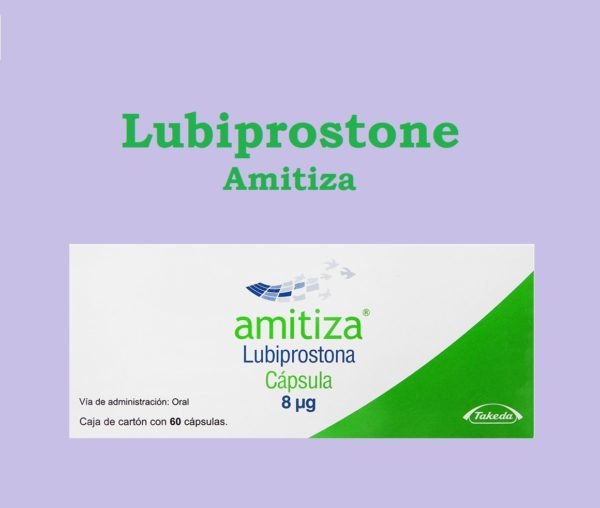Lubiprostone (Amitiza) acts in the gastrointestinal lumen and increase the GI transit and intestinal fluid secretion.
Lubiprostone (Amitiza) Indications:
-
It is indicated in the treatment of the following conditions:
- Chronic idiopathic constipation (CIC) in adults
- Irritable bowel syndrome (IBS) with constipation
- Opioid-induced constipation (OIC) in adult patients with chronic pain related to prior cancer or its treatment who do not require frequent opioid dose escalation.
Lubiprostone (Amitiza) Dose in Adults:
Lubiprostone (Amitiza) Dose in the treatment of chronic idiopathic constipation:
- 24 mcg orally two times a day.
Dose in the treatment of Irritable bowel syndrome with constipation in females 18 years of age or more:
- 8 mcg orally two times a day
Lubiprostone (Amitiza) Dose in the treatment of opioid-induced constipation:
- 24 mcg orally two times a day.
Lubiprostone (Amitiza) dose in children:
The safety and efficacy of the drug in children have not been established.
Pregnancy Risk Category: C
- Negative fetal outcomes have been documented in animal reproduction studies.
Use of lubiprostone while breastfeeding
- It is unknown whether the active metabolite or drug are excreted into breastmilk.
- Manufacturer recommends that you monitor your infant for signs of diarrhea.
- Manufacturers recommend weighing the risks to the infant from drug exposure and the benefits for the mother.
Dose in Kidney disease:
Adjustment in the dose is not necessary.
Lubiprostone (Amitiza) Dose in Liver disease:
-
Mild hepatic impairment (Child-Pugh class A):
- No dosage adjustment is necessary.
-
Moderate hepatic impairment (Child-Pugh class B):
-
Chronic idiopathic constipation or opioid-induced constipation:
- 16 mcg two times a day initially.
- The dose may be increased to 24 mcg two times a day if an adequate response has not been obtained and the drug is tolerated.
-
Irritable bowel syndrome with constipation:
- Adjustment in the dose is not necessary.
-
-
Severe hepatic impairment (Child-Pugh class C):
-
Chronic idiopathic constipation or opioid-induced constipation:
- 8 mcg two times a day initially.
- The dose may be increased to 16 to 24 mcg two times a day if an adequate response has not been obtained and the drug is tolerated.
-
Irritable bowel syndrome with constipation:
- 8 mcg once a day initially.
- The dose may be increased to 8 mcg two times a day if an adequate response has not been obtaine and the drug is well tolerated.
-
Common Side Effects of Lubiprostone (Amitiza):
-
Central nervous system:
- Headache
-
Gastrointestinal:
- Nausea
- Diarrhea
Less Common Side Effects of Lubiprostone (Amitiza):
-
Cardiovascular:
- Edema
- Chest discomfort
- Chest pain
- Peripheral edema
-
Central nervous system:
- Dizziness
- Fatigue
-
Gastrointestinal:
- Abdominal pain
- Flatulence
- Abdominal distention
- Abdominal distress
- Loose stools
- Vomiting
- Dyspepsia
- Xerostomia
-
Respiratory:
- Dyspnea
Contraindications to Lubiprostone (Amitiza):
Patients with a suspected or known mechanical GI (gastrointestinal obstruction) are not advised to use it.
Warnings and precautions
- Dyspnea
- Dyspnea can occur after the first dose. It may manifest as tightness in the chest and difficulty taking deep breaths.
- Dyspnea can occur immediately (within 30-60 minutes) following the first dose. However, it has been reported to also occur with subsequent dosing.
- Nausea:
- To reduce nausea and improve GI tolerability, the drug should be taken with food
- Hypotension and syncope:
- Syncope and hypotension may occur when the drug is combined with antihypertensive medications or higher doses.
- Hypotension can occur after the first dose. It will usually resolve before the next scheduled dose or after discontinuation.
- Patients may require hospitalization in severe cases.
- Diarrhea:
- Patients with severe diarrhea should avoid it.
- Gastrointestinal obstruction:
- Patients with mechanical gastrointestinal obstruction should avoid it.
- Before prescribing any drug, all patients must be examined for mechanical GI obstruction.
- Hepatic impairment
- Patients with severe or moderate hepatic impairment may be at greater risk of drug exposure. Adjustments in doses may be necessary.
Lubiprostone: Drug Interaction
|
Levomethadone |
May diminish the therapeutic effect of Lubiprostone. |
|
Methadone |
May diminish the therapeutic effect of Lubiprostone. |
Monitor:
- Bowel frequency and consistency
- Liver function tests at baseline and periodically as indicated.
How to administer Lubiprostone (Amitiza)?
Oral: Administer with food and water. Swallow whole; do not break or chew.
Mechanism of action of Lubiprostone (Amitiza):
- It acts locally on the apical membrane in the gastrointestinal tract and is a chloride channel activater.
- This bypasses the antisecretory effects opiates have on secretomotor neuron excitability.
Absorption:
- The systemic absorption of the parent drug is poor while that of the active metabolite is low.
Distribution
- beyond the gastrointestinal tract is minimal.
Plasma proteins binding:
- 94%
Metabolism:
- Extensively within the stomach and jejunum by carbonyl reductase to active (M3) and inactive metabolites rapidly.
Bioavailability:
- The bioavailability of the drug is minimal
Half-life elimination
- The half-life elimination of the active metabolite (M3) is 0.9 to 1.4 hours
The time to reach peak plasma concentration:
- about 1.1 hours for the active metabolite (M3).
Excretion:
- Parent drug and M3: Feces (trace amounts)
International Brands of Lubiprostone:
- Amitiza
- Amiprostone
- Lubilax
- Lubistone
- Lubowel
- Lupicont
- Luprostam
- Modulex
Lubiprostone Brand Names in Pakistan:
No Brands Available in Pakistan.







